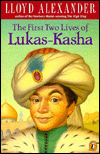
Reading it in the bifocal way, where I'm reading the words that I don't really remember but also reading the memories that the scenes seem to stir up, reminds me why I accumulate Alexander's books but rarely remember to list him among my favorite authors. He seems to write a bit too much from the mind even when telling stories from the heart, so that there is always a gap between the reader and the story. This is true in this book, where the emphasis on showing rather than telling keeps me aware that I'm reading a story.
 |
| BarockSchloss CC License |
But it's still a wonderful story, with Lukas moving from a boy who revels in idleness to someone who has recognized responsibility and loyalty and knows that life without it is thin and unrewarding. I love how Alexander never explains the fantasy, but leaves the characters and the readers with the events but no explanation. Was it real? Does it matter?
I think I'll hand this book to my sixth grader to read this summer; he'll like the ambiguity and should also appreciate Lukas's pacifism.
No comments:
Post a Comment